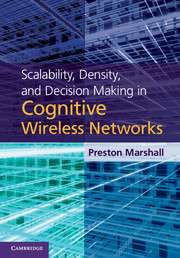Book contents
- Frontmatter
- Contents
- Preface
- Part I Overview
- Part II Generalized environmental characterization
- Part III System performance of cognitive wireless systems
- Part IV Integrated awareness and decision making
- Part V Summary
- 17 Further research needs in cognitive wireless networks
- Part VI Appendices
- Index
- References
17 - Further research needs in cognitive wireless networks
from Part V - Summary
Published online by Cambridge University Press: 05 December 2012
- Frontmatter
- Contents
- Preface
- Part I Overview
- Part II Generalized environmental characterization
- Part III System performance of cognitive wireless systems
- Part IV Integrated awareness and decision making
- Part V Summary
- 17 Further research needs in cognitive wireless networks
- Part VI Appendices
- Index
- References
Summary
Introduction
This chapter provides an overview of future wireless networking research needs, and the author's perception of the challenges and some of the obstacles that it faces. The field of cognitive wireless has existed in some form for well over a decade, at the time of writing, and yet no commercial or widely deployed implementations of it have even been seriously offered for deployment. Conference attendance primarily consists of academic researchers, with limited participation by several major corporate research organizations. There is little participation by the product-development community or venture-capital investors. The wireless technologies that dominate wireless operation had to leave the research community and be adopted as commercially and economically viable with cost and engineering feasibility. It is clear that current wireless research has not created the perception that is an essential element in the investment or product strategy for wireless advancement, at least in commercial practice.
This is not an argument against theoretical research. Quite the opposite; it is the basic theoretical research that will establish the argument that the benefits of this technology are universal and globally applicable to a wide range of architectures, not just those used as examples in a particular implementation. Showing cognitive features in a wireless fidelity (Wi-Fi) network will not be meaningful to cellular designers unless coupled with an argument that the reported benefits are much more universal and inherent than just to Wi-Fi.
Information
- Type
- Chapter
- Information
- Publisher: Cambridge University PressPrint publication year: 2012
